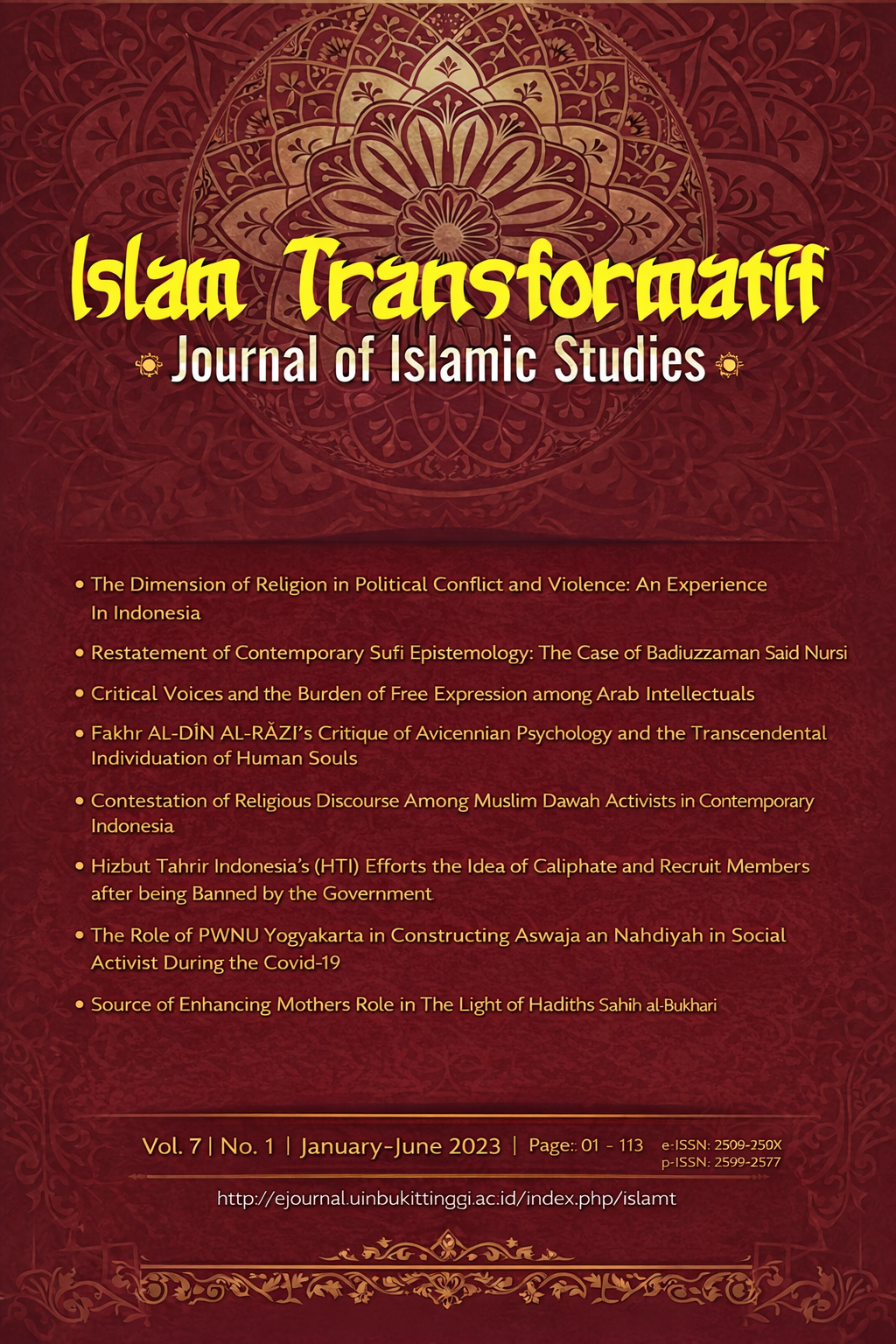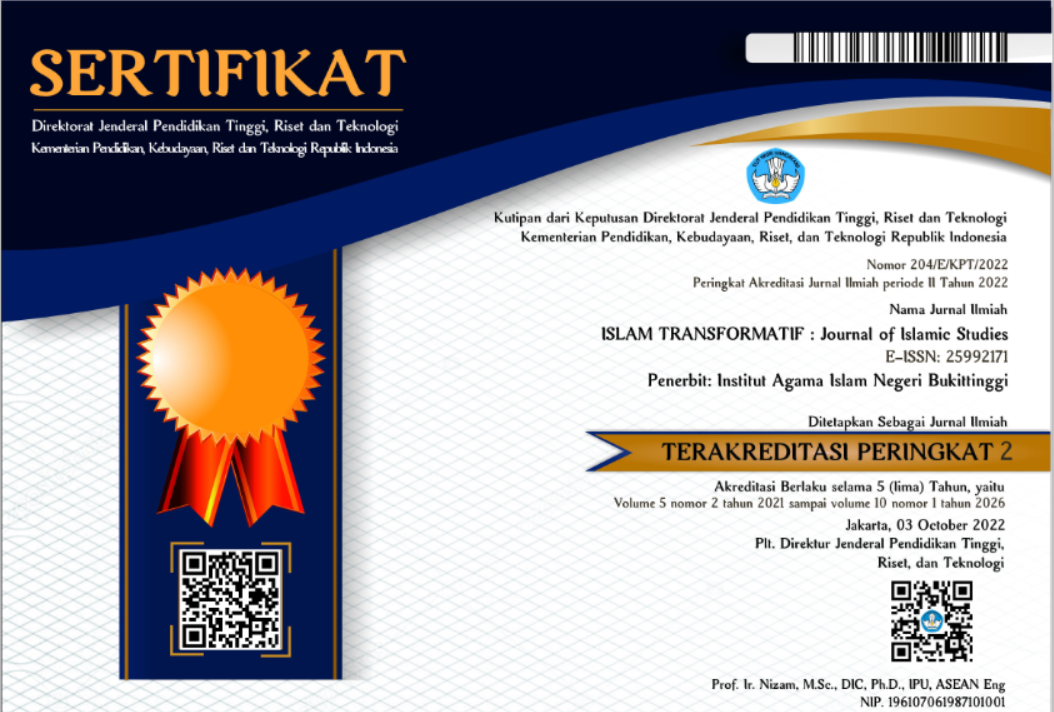Critical Voices and the Burden of Free Expression among Arab Intellectuals
DOI:
https://doi.org/10.30983/it.v7i1.6187Keywords:
Arab intellectuals, freedom of expression, the Arab Spring, SyriaAbstract
This paper analyzes the freedom of expression challenge (ta’bÄ«r al-hurriyyah) through Arab intellectual experiences. Although freedom of expression has doctrinal support and historical factual expertise in Islam, it is still challenging to find its actual implementation within the Arab world, especially in Arab countries with authoritarian systems. Therefore, the paper begins by exploring several examples of intimidation experienced by Arab intellectuals as the consequences of their critical ideas and voices. Specifically, the paper examines freedom of expression among Arab scholars in Syrian as an authoritarian state. The failure of the Arab Spring made it more difficult for freedom of expression to find its free space. As a qualitative study, data was collected by gathering essential information from journals, books, and online websites. The data were then analyzed through critical reading based on formulated research questions. The paper concluded that freedom of expression has its historical doctrine in Arab-Islam. However, this moral doctrine did not lead to absolute freedom of expression. It is proved that most Arab intellectuals experienced bitter life due to their critical voices. In the Syrian context, Arab intellectuals are divided between those who support the regime and maintain opposition to the ruling government. However, the opposition keeps conducting the reform in silence since the voices and protests will lead them to exile or death. Due to this polarization, critical voices in Syria have not successfully become a powerful movement.Â
References
Abdo, Geneive. No God but God: Egypt and the Triumph of Islam. Oxford University Press, 2002.
Abu-RabiÊ», Ibrahim M. Contemporary Arab Thought: Studies in Post-1967 Arab Intellectual History. London: Pluto Press, 2004.
Ajami, Fouad. The Arab Predicament: Arab Political Thought and Practice since 1967. Cambridge University Press, 1992.
Akhavi, Shahrough. “The Dialectic in Contemporary Egyptian Social Thought: The Scripturalist and Modernist Discourses of Sayyid Qutb and Hasan Hanafi.†International Journal of Middle East Studies 29, no. 3 (1997): 377–401.
Alhindi, Waheed Ahmed, Muhammad Talha, and Ghazali Bin Sulong. “The Role of Modern Technology in Arab Spring.†Archives Des Sciences 65, no. 8 (2012): 101–12.
Ali, Muhammad Bhat. “Freedom of Expression from Islamic Perspective.†Journal of Media and Communication Studies 6, no. 5 (2014): 69–77.
Allagui, Ilhem, and Johanne Kuebler. “The Arab Spring and the Role of ICTs| Introduction.†International Journal of Communication 5 (2011): 8.
Al-Saqaf, Walid. “Internet Censorship Circumvention Tools: Escaping the Control of the Syrian Regime.†Media and Communication 4, no. 1 (2016): 39–50.
Alzumai, F. “Constitutional Courts in the Arab World and Freedom of Expression: A Defender or Suppressor,†15:29–48, 2022. doi:10.1163/18763375-14010004.
Busetto, Loraine, Wolfgang Wick, and Christoph Gumbinger. “How to Use and Assess Qualitative Research Methods.†Neurological Research and Practice 2 (2020): 1–10.
Devlin, John F. “The Baath Party: Rise and Metamorphosis.†The American Historical Review, 1991, 1396–1407.
Esposito, John L, and John Obert Voll. Makers of Contemporary Islam. Oxford University Press, USA, 2001.
France-Presse, Agence. “Egyptian Professor in Hot Water for Comparing Quran to Supermarket - Daily News Egypt.†Daily News Egypt, 2006. https://ww.dailynewssegypt.com/2006/10/01/egyptian-professor-in-hot-water-for-comparing-quran-to-supermarket/.
Gabsi, Zouhir. “Tunisia’s Youth: Awakened Identity and Challenges Post-Arab Spring.†British Journal of Middle Eastern Studies 46, no. 1 (2019): 68–87.
Ghadry, Farid N. “Syrian Reform: What Lies Beneath.†Middle East Quarterly, January 1, 2005, 61–70.
Ghannam, Jeffrey. “Social Media in the Arab World: Leading up to the Uprisings of 2011.†Center for International Media Assistance 3, no. 1 (2011): 1–44.
Ghrer, Hussein. “Social Media and the Syrian Revolution.†Westminster Papers in Communication and Culture 9, no. 2 (2017).
Hamdy, Naila. “Arab Citizen Journalism in Action: Challenging Mainstream Media, Authorities and Media Laws.†Westminster Papers in Communication and Culture 6, no. 1 (2017).
Hanafi, Hassan. Ad-DÄ«n Wats-Tsaurah FÄ« Mishr 1952-1981: Al-YasÄr al-IslÄmÄ« Wal Wihdah al-Wathaniyyah. al-QÄhirah: Maktabah Madbuli, 1989.
Hassan, Rosa Yassin, and Max Weiss. “Where Are the Intellectuals in the Syrian Revolution?†In Arabic Thought against the Authoritarian Age, edited by Jens Hanssen and Max Weiss, 370–73. Cambridge: Cambridge University Press, 2018. doi:10.1017/9781108147781.021.
Hidayat, Usep Taufik. “Tafsir Al-Azhar: Menyelami Kedalaman Tasawuf Hamka.†Buletin Al-Turas 21, no. 1 (2015): 49–76. doi:https://doi.org/10.15408/bat.v21i1.3826.
Hinnebusch, Raymond. “Syria’s Alawis and the Ba’ath Party.†The Alawis of Syria: War, Faith and Politics in the Levant, 2015, 107.
In’amuzzahidin, Muh. “Konsep Kebebasan Dalam Islam.†At-Taqaddum 7, no. 2 (2017): 259–76.
Kassab, Elizabeth Suzanne. Contemporary Arab Thought : Cultural Critique in Comparative Perspective. New York: Columbia University Press, 2010.
Kersten, Carool. Cosmopolitans and Heretics: New Muslim Intellectuals and the Study of Islam. Hurst & Co Publishers and Oxford University Press, 2011.
Khashoggi, Jamal. “Opinion | Jamal Khashoggi: What the Arab World Needs Most Is Free Expression - The Washington Post.†The Washington Post, October 18, 2018. https://www.washingtonpost.com/opinions/global-opinions/jamal-khashoggi-what-the-arab-world-needs-most-is-free-expression/2018/10/17/adfc8c44-d21d-11e8-8c22-fa2ef74bd6d6_story.html.
Kienle, Eberhard. “Egypt without Mubarak, Tunisia after Bin Ali: Theory, History and the ‘Arab Spring.’†Economy and Society 41, no. 4 (2012): 532–57.
Kimball, Sam. “Rapping the Arab Spring.†World Policy Journal 30, no. 4 (2013): 79–86.
Lukianov, Dmytro V, Volodymyr M Steshenko, and Hanna P Ponomarova. “Freedom of Expression and Islam: Charlie Hebdo’s Lessons.†Journal of the National Academy of Legal Sciences of Ukraine 28, no. 1 (2021): 61–70.
Madani, Abdul Hai. “Freedom and Its Concept in Islam,†17:116–20, 2011.
Mohamed, Eid. “Culture and Society during Revolutionary Transformation: Rereading Matthew Arnold and Antonio Gramsci in the Context of the Arab Spring’s Cultural Production.†International Journal of Cultural Studies 23, no. 2 (March 1, 2020): 150–68. doi:10.1177/1367877919842572.
Moussa, Mohamed Ben. “From Arab Street to Social Movements: Re-Theorizing Collective Action and the Role of Social Media in the Arab Spring.†Westminster Papers in Communication and Culture 9, no. 2 (2017).
Murphy, Caryle. Passion for Islam: Shaping the Modern Middle East: The Egyptian Experience. New York: Scribner, 2002.
Nadhem, Hassan. “Arab Intellectuals and Authority: A Continuity of an Implied System.†Kufa Review 1, no. 1 (2012): 67–82.
Najjar, Fauzi M. “Islamic Fundamentalism and the Intellectuals: The Case of Naguib Mahfouz.†British Journal of Middle Eastern Studies 25, no. 1 (1998): 139–68.
Olsson, Susanne. “Apostasy in Egypt: Contemporary Cases of Ḥisbah.†The Muslim World 98, no. 1 (January 1, 2008): 95–115. doi:10.1111/j.1478-1913.2008.00212.x.
“On the Deteriorating State of Free Expression in the Arab World - IFEX.†Accessed April 9, 2023. https://ifex.org/on-the-deteriorating-state-of-free-expression-in-the-arab-world/.
Oun, Musab A, and Christian Bach. “Qualitative Research Method Summary.†Qualitative Research 1, no. 5 (2014): 252–58.
Pace, Michelle, and Francesco Cavatorta. “The Arab Uprisings in Theoretical Perspective - An Introduction.†Mediterranean Politics, 2012. doi:10.1080/13629395.2012.694040.
Pearlman, Wendy. “Narratives of Fear in Syria.†Perspectives on Politics 14, no. 1 (2016): 21–37.
Perlmutter, Amos. “The Praetorian State and the Praetorian Army: Toward a Taxonomy of Civil-Military Relations in Developing Polities.†Comparative Politics 1, no. 3 (1969): 382–404.
“Press Freedom Reversals in Post-Arab Spring Countries | Arab Center Washington DC.†Accessed July 22, 2020. http://arabcenterdc.org/policy_analyses/press-freedom-reversals-in-post-arab-spring-countries/.
Regier, Terry, and Muhammad Ali Khalidi. “The Arab Street: Tracking a Political Metaphor.†The Middle East Journal 63, no. 1 (2009): 11–29.
S, T. “Sadiq Al-Azm: Portrait of a Syrian Intellectual.†The Syrian Observer, December 13, 2016. https://syrianobserver.com/features/24608/sadiq_al_azm_portrait_a_syrian_intellectual.html.
Saeed, Dr, and Riaz Ahmad. “Quranic Concept of the Freedom of Expression: A Descriptive Study in Modern Socio-Political Perspective.†Al-Qalam June, 2013.
Sahide, Ahmad, Yoyo Yoyo, and Ali Muhammad. “Tunisia’s Success in Consolidating Its Democracy One Decade Post-the Arab Spring.†Jurnal Ilmu Sosial Dan Ilmu Politik 26, no. 1 (n.d.): 49–62.
Said, Noor Asma, and WMKFW Khairuldin. “Freedom of Speech in Islam and Its Connection with Street Demonstrations.†International Journal of Academic Research in Business and Social Sciences 7, no. 4 (2017): 122–29.
Sayadi, Emna. “Tunisia: Is Freedom of Expression under Threat Due to the Economic Crisis? - Access Now.†Access Now, January 30, 2018. https://www.accessnow.org/tunisia-freedom-expression-threat-due-economic-crisis/.
Shishkina, Alisa, and Leonid Issaev. “Internet Censorship in Arab Countries: Religious and Moral Aspects.†Religions 9, no. 11 (2018): 358.
Soage, Ana B. “"Faraj Fawda, or the Cost of Freedom of Expression“.†The Middle East Review of International Affairs 11, no. 2 (2007): 26–33.
Stevens, Jennifer M. “Blue Lives Matter: Identity and the Internet,†2021.
“Syrian Intellectuals: A Problem of Fear, or a Crisis of Consciousness - Google Search.†Accessed April 16, 2023. https://www.google.com/search?q=Syrian+Intellectuals%3A+A+problem+of+fear%2C+or+a+crisis+of+consciousness&oq=Syrian+Intellectuals%3A+A+problem+of+fear%2C+or+a+crisis+of+consciousness&aqs=chrome..69i57j69i60.562j0j15&sourceid=chrome&ie=UTF-8.
Americans for Democracy & Human Rights in Bahrain (ADHRB). “Systematic Attack on Freedom of Expression in Oman | Americans for Democracy & Human Rights in Bahrain,†2020. https://www.adhrb.org/2020/04/systematic/.
Electronic Frontier Foundation. “The Crime of Speech: How Arab Governments Use the Law to Silence Expression Online,†April 25, 2016. https://www.eff.org/pages/crime-speech-how-arab-governments-use-law-silence-expression-online.
VERICAT, JOSÉ. “Intellectuals before the Uprising.†In Light of the Intellectuals: International Peace Institute, 2014. JSTOR. http://www.jstor.org/stable/resrep09631.4.
Wahyudi, Yudian. Dinamika Politik “Kembali Kepada al-Qur’an Dan Sunnah Di Mesir, Maroko, Dan Indonesia". Yogyakarta: Pesantren Nawesea Press, 2007.
Yoyo. Pemikiran Arab: Dinamika Intelektual, Ideologi, Dan Gerakan. Yogyakarta: Sociality, 2017.
———. “Sociology of Failure in the Contemporary Arab Thought (Reading on SyauqÄ« JalÄl’s Work on the Arab Left).†Codrul Cosminului 26, no. 1 (2020): 45–56. doi:10.4316/CC.2020.01.004.
Yoyo, Yoyo. “Neo-Patriarchy and the Problem of the Arab Crisis: A Critical Study on Hisham Sharabi’s Works.†QIJIS (Qudus International Journal of Islamic Studies) 6 (August 24, 2018): 251–68. doi:10.21043/qijis.v6i2.3808.
Yoyo, Yoyo, Fadlil Munawwar Ahimsa Putra, Heddy Shri Manshur, and Setiawati Muti’ah. “Tren Pemikiran Intelektual Muslim Kontemporer Di Timur Tengah Pasca-Difitisme 1967.†Kawistara 2, no. 3 (December 22, 2012): 225–328. doi:10.22146/kawistara.3941.
Zayd, Naá¹£r ḤÄmid AbÅ«. Critique of Religious Discourse. New Haven and London: Yale University Press, 2018.
Downloads
Published
How to Cite
Issue
Section
Citation Check
License
Copyright (c) 2023 Yoyo Yoyo

This work is licensed under a Creative Commons Attribution-ShareAlike 4.0 International License.
Authors who publish with this journal agree to the following terms:
- Authors retain copyright and grant the journal right of first publication with the work simultaneously licensed under a Creative Commons Attribution-ShareAlike 4.0 International License that allows others to share the work with an acknowledgment of the work's authorship and initial publication in this journal.
- Authors are able to enter into separate, additional contractual arrangements for the non-exclusive distribution of the journal's published version of the work (e.g., post it to an institutional repository or publish it in a book), with an acknowledgment of its initial publication in this journal.
- Authors are permitted and encouraged to post their work online (e.g., in institutional repositories or on their website) prior to and during the submission process, as it can lead to productive exchanges, as well as earlier and greater citation of published work (See The Effect of Open Access).




